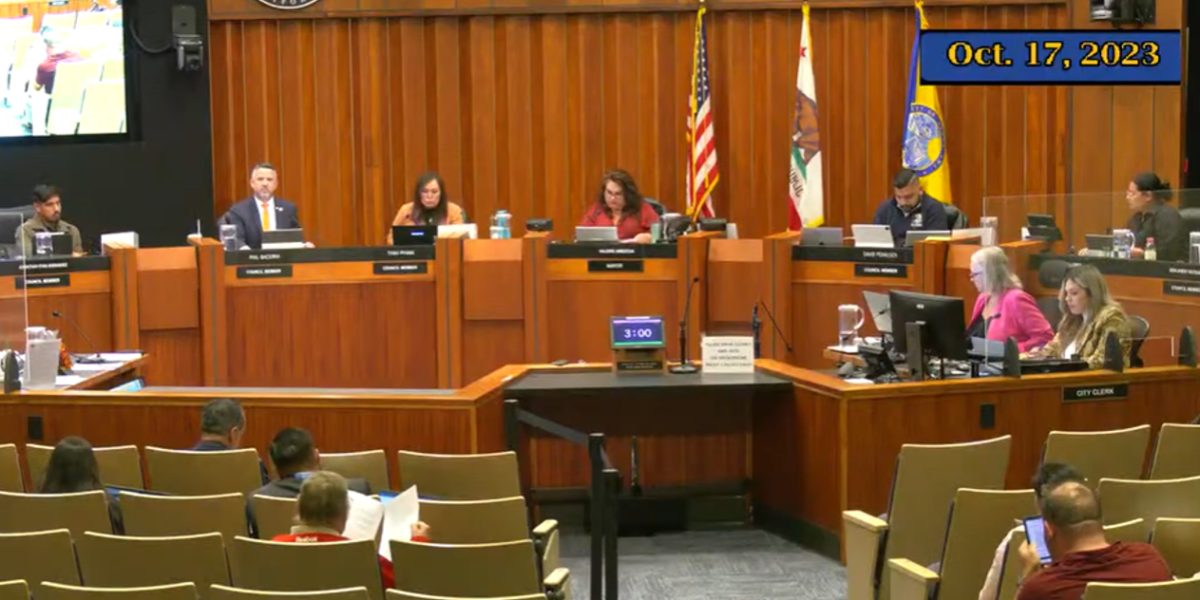The four-member progressive majority on the Santa Ana City Council continued its hasty drive to allow noncitizens to vote in city elections, despite warnings from their council colleagues and staff that it will costs millions to implement and likely lead to costly litigation.
Councilmembers Thai Phan, Ben Vasquez, Johnathan Hernandez and Jessie Lopez all strongly supported placing the proposed charter amendment in the November 2024 ballot in hopes city voters will approve it, paving the way for noncitizens – including illegal immigrants – to vote in elections for mayor, city council and municipal ballot measures.
If successful, Santa Ana would be the first city in California to allow non-Americans to vote in city elections.
Mayor Valerie Amezcua and Councilmembers Phil Bacerra and David Penaloza voted against the proposed charter amendment.
Councilmember Thai Phan is the prime mover on the dais behind the effort to allow non-Americans to vote in city elections.
The question that voters will decide is:
“Shall the city of Santa Ana City Charter be amended to allow, by the November 2028 general municipal election, non-citizen city residents, including those who are taxpayers and parents, to vote in all city of Santa Ana municipal elections.”
The ballot question language drafted by staff was more neutral and clearly focused, referring to allowing “City residents who are not citizens of the United States to vote in all City of Santa Ana municipal elections.”
In what appears to be an attempt to tip the electoral scale, Phan changed to language to more emotionally loaded (and redundant) “non-citizen city residents, including those who are taxpayers and parents.”
Emphasizing their belief that non-citizens are “disenfranchised” and must be “given a voice,” the progressive council majority brushed aside concerns about the problems associated with non-citizen voting such as the steep cost of implementation, permanently operating an expensive parallel election bureaucracy, and the cost of almost certain litigation – all of which would run into the millions of dollars, according to city staff.
Mayor Amezcua questioned why Councilmembers Phan, Lopez, Vasquez and Hernandez were so willing to divert millions in taxpayer dollars from pressing issues such as crime, addressing homelessness and public intoxication so that non-citizens can vote in city elections.
“I cannot say with absolute certainty that this matter if approved by the voters would go unchallenged,” City Attorney Sonia Carvalho told the council. “I do want to let the council know that if you do end up in litigation that litigation will be quite costly.”
Carvalho said the council should count on spending at least $500,000 on initial litigation challenges, and expect that to increase to at least $1 million to defend noncitizen voting in appellate courts.
City officials do not know if the county Registrar of Voters could or would administer elections in which non-Americans were voting. Even if the charter amendment was approved by voters, non-citizens are prohibited from voting in county, state and federal elections – which would necessitate creating a separate, parallel system of voting in city elections for the benefit of non-citizens.
“There would be a cost associated with determining a registration process, potentially separate ballots, potentially the machines for counting or canvassing, etc,” said Hall, in addition to hiring more staff in the City Clerk and City Attorney’s office.
Relying on research conducted by another Orange County city about holding stand-alone elections, City Clerk Jennifer Hall estimated it would cost millions of dollars for the city to implement such a system on its own:
- $664,000 to $858,000 to buy election equipment.
- $689,000 to $832,000 in recurring costs for each election
The research cited by Hall estimated the cost of just one stand-alone election to be $1.35 to $1.69 million. Furthermore, that cost estimate is on the low side because it is based on an electorate of 133,000 voters. If noncitizens are allowed to vote, the number of Santa Ana voters would swell from 128,000 to nearly 200,000.
Acting City Manager Steve Mendoza confirmed that the additional millions of dollars necessary to operate this parallel election system to enable noncitizen voting would come from the city’s general fund.
Mendoza also noted that staff really doesn’t know big the City Clerk’s department would have to become to operate such a system.
After noting that San Francisco spend four years on the question of allowing noncitizens to vote in school board elections before proceeding with it, Amezcua questioned why the progressive council was in such a rush to place this charter amendment on the ballot when so many critical questions remain unanswered.
“San Francisco took four years for the school board election,” said Amezcua. “They studied it, they had an ad hoc, it ended up in court, and you know, it just went up the chain for years.”
“And the majority of this council is doing it in less than two months for whatver their political objectives are,” said Amezcua.
Councilman David Penaloza accused the progressive majority of being “lazy” and expressed no confidence in the city’s ability to competently implement noncitizen voting, noting that the rental registry program is a “complete failure” despite being two years in the making.
Even the progressive council majority tacitly admitted the enormous hurdles involved in non-citizen voting when they approved Councilmember Phan’s amendment to move the implementation from 2026 to 2028.
“They don’t know how much this is going to cost to the taxpayers, they don’t know what what this looks like in the city,” said Penaloza. “We just saw we can’t even handle rental registry, because it’s a complete failure. And that’s been two years in the making.”
“But we’re going to register [non-citizens] to vote, make sure they get ballots, make sure they have voting centers and make sure they vote?,” Penaloza said. “I can tell you right now that four years isn’t enough – that is that it’s going to be a disaster.”
“Why? Because this council [majority] is lazy and don’t want to do the work. They don’t want to answer the hard questions of what this is going to look like,” said Penaloza.
Councilman Phil Bacerra reiterated his concern that encouraging non-citizens to vote in city elections will jeopardize their chances of becoming U.S. citizens.
“While we’ve got some law students in the audience that swear it won’t endanger their ability,” said Bacerra, referring to left-wing activists organized to speak by radical non-profits, “I’m going to defer to our city attorney who has quite a bit of more experience than some of the folks armchair lawyering from the audience.”
Bacerra challenged the idea that non-citizens have “no voice” in civic affairs and that the only way to give them one is through the vote.
“Whether one votes in Santa Ana or doesn’t, to say that you’re disenfranchised, maybe in your ward, maybe in some of the council members up here who don’t pay attention to you,” said Bacerra, “But the folks in Ward 4 know whether they’re a resident or not, whether they’re a citizen or not, I pay attention my ward. I’d like to believe that all my colleagues up here do and I don’t believe that they need to check your citizenship to do that. I know I don’t.”
Phan defended allowing non-Americans to vote in city elections.
“Expanding the franchise is never easy in this country,” she argued. “It was local governments that gave women the right to vote before the 19th amendment.”
Phan’s comparison is off-the-mark: woman’s suffrage gave the vote to people who were already American citizens, while Phan seeks to extend a privilege of citizenship to non-citizens.
Councilman Ben Vasquez resorted to gauzy progressive rhetoric to justify allowing non-Americans – including illegal immigrants – to vote in Santa Ana city elections.
“Why do we want non-citizen voting? The reason is simple: because they’re human beings. Because they’re human beings” said Vasquez – a rationale with no limiting principle that would also require allowing children to vote in elections.
“Just like black men wanted the right to vote and we gave [it to] them because they’re human beings. When indigenous were given the right to vote because they’re human beings. When women were given the right to vote, because they’re human beings. When our Asian brothers and sisters won the right to vote is because they’re human beings,” the Ward 2 councilman droned.
Vasquez, who teaches history and Ethnic Studies in the Santa Ana Unified School District, gets history wrong and omits a key truth in his roll call of civil rights: those were all examples of American citizens redeeming the right to vote that is theirs as American citizens.
What Vasquez proposes is completely different: bestowing a privilege of American citizenship on people simply because they’re drawing breath within Santa Ana city limits.


